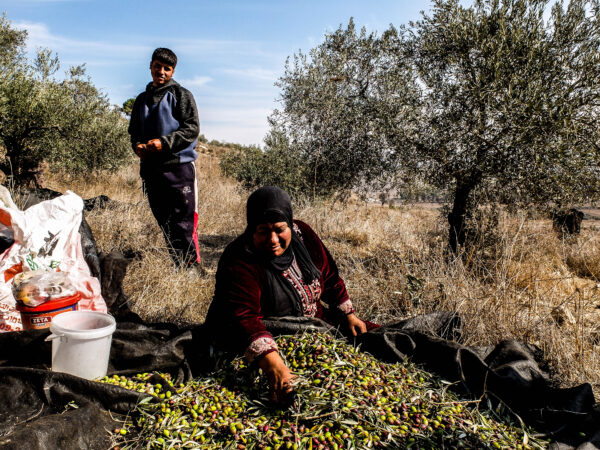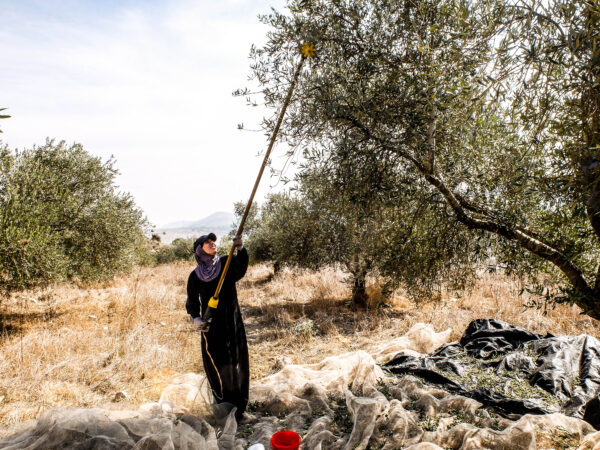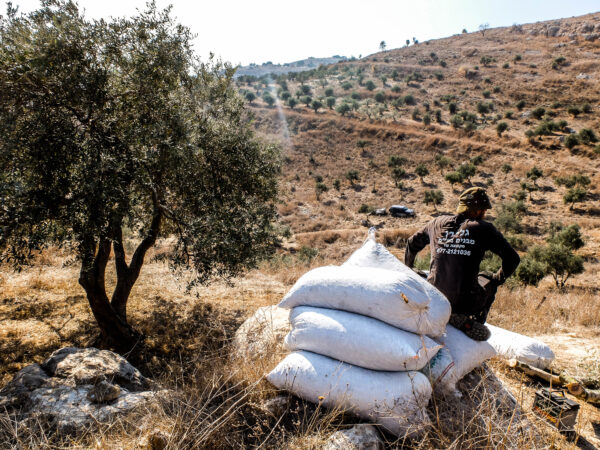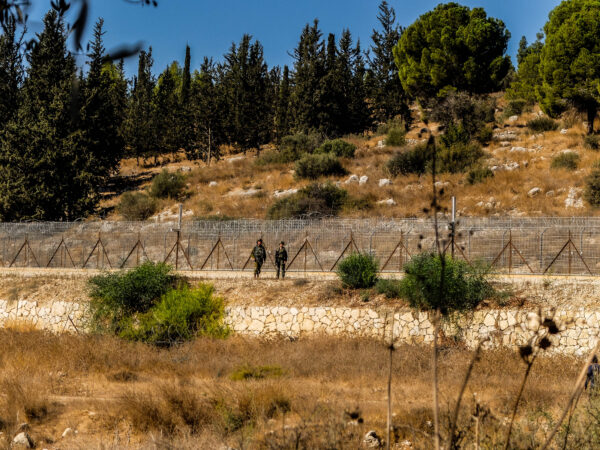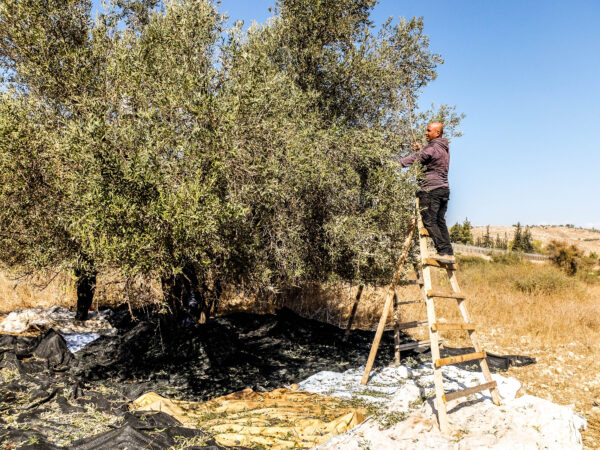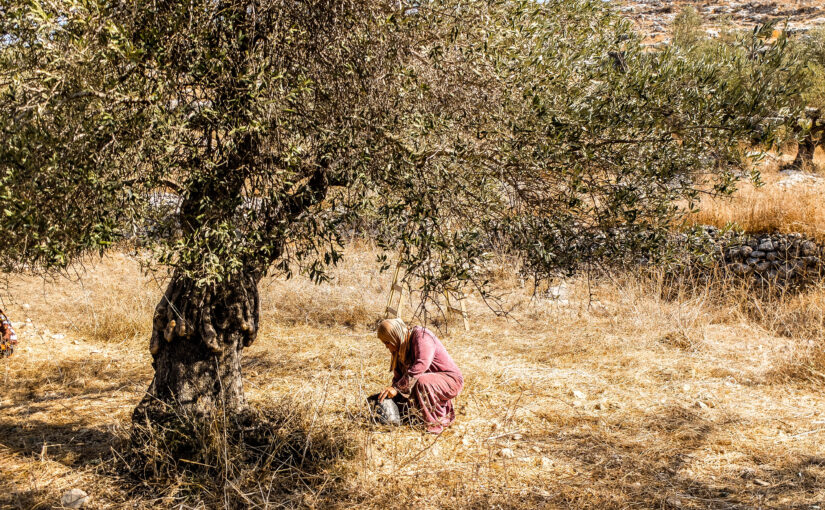Ahmad smiles, his eyes black, his wrinkles deep. He speaks his basic English as he lugs around plastic bags and water bottles: a breakfast that looks to me more like lunch. His olive grove is in front of a settlement; one of many Israeli settlements that are illegal under international law but have been colonizing the West Bank for decades.
“Five days ago I came to clean the land, but I couldn’t. The settlers shot at me,” he says.

On the hill in front of us stands Einav, the Israeli settlement built on 470 dunams (1 dunam = 1/10 hectare) “confiscated” from the Palestinian village of Ramin and 20 dunams stolen from Kafr al-Labad . A wire fence in the valley divides the military road from Palestinian olive groves.
“I planted these trees 45 years ago. Then, there was no one there.” Ahmad points to the houses. There are now three clusters of Israeli houses that have sprung up in the last few decades. The first construction was in 1981, and settlement named 30 years ago, “and they keep expanding.”
A half-buried tear gas canister is testament to one of many moments of repression by the military who patrol the area.
“My daughter has not been back here for 12 years. She was afraid, and I was afraid for her.”
Jasmine is 21, a recent college graduate. Glasses, a light black veil covers her hair. “They are dangerous. They scare me,” she admits. “Look: they burned those.”
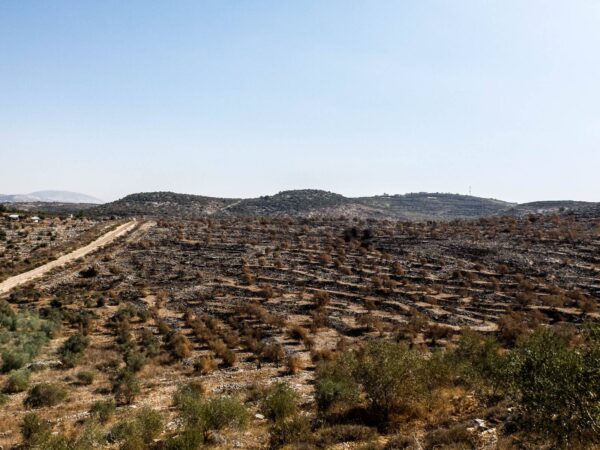
Not far away, an expanse of charred trees reaches the fence. “Those are our neighbour’s, but we had more than 50 burned a little further away, too. All a few months ago.”
Settler attacks are nothing new, but since 7th October last year, the burning and destruction of olive trees has been increasing throughout the West Bank. According to the Colonization & Wall Resistance Commission, from the beginning of this harvest season until 29th October, 239 attacks against olive pickers were recorded. They include assaults with stones and sticks, threats, gunfire, burning and destruction of olive groves. Crop theft and violence of various kinds are commonplace, and in at least 109 cases, Palestinians have been prevented from accessing their land by settlers or the military. A 59-year-old woman, Hanan Abdul Rahman Abu Salama was killed in the village of Faqqu’a, northeast of Jenin by settlers, and over 50 people were injured in the two months of harvesting. These are only the confirmed cases.
Meanwhile, fires set by settlers have destroyed thousands of trees this year. On 6 November, in the village of Qaryut alone, Palestinian farmers found more than 500 ancient olive trees cut down. They had been violently prevented by the Israelis from accessing their land for two years. Earlier this month they obtained a “coordination,” a two-day agreement with the occupation forces that they could go and harvest the olives. They arrived in the morning to find that most of the trees had been cut down. They were also assaulted by the military and settler “security” who “confiscated” their olive harvesting equipment.
“Why are they doing this? This is our life,” says Ahmad, angry. He worked for 49 years in ’48, the country the rest of the world calls Israel. He was an electrician. “Since 7 Oct., I can’t go there any more. I also speak Hebrew, I read it. Those people don’t care about anyone.”
Ahmad is almost 65 years old, has five children, and numerous grandchildren. He has been picking olives in these hills since he was a child.
The work is long, and beautiful, and tiring: first you put tarpaulin sheets under the tree to cover the ground, making sure they overlap leaving no gaps. Then the harvest begins: you can pick with your hands, rake the branches with brightly-coloured plastic combs, shake the trees, and hit them with sticks: everything comes in handy to get the olives off the branches. Then they are piled up, and the bigger sticks and leaves that have landed on the tarps with them are picked out by hand. They are then thrown into buckets and emptied into large plastic bags that are very heavy to carry.
“The soldiers are coming!” someone shouts. About 300 metres away, five military personnel are crossing the fence, heading in our direction.
“Let’s keep working. This is my land!” In Ahmad’s eyes shines the anger of those who have been abused for too long. There are many of us, close to 20 international solidarity activists who have come to support the Palestinians at this sensitive time of year. Indeed, the olive harvest is crucial to the livelihood of thousands of Palestinian families, and the Israelis know it. That’s why they try to disrupt or prevent it where they can. Almost everyone in Palestine has a few trees; Palestinian oil is well known throughout the region. It’s an ancient tradition, and the economy of many villages is based precisely on the products derived from it.
The olive groves near settlements are the most dangerous: settlers, sometimes just children, frighten Palestinians away. The settlers’ “security” service goes around with machine guns, and they are joined by the army, which under the guise of self-defence, push the Palestinians further and further away, saying they cannot stray near the settlements.
The soldiers peer at us from above, machine guns drawn, body armor, knee pads, helmet. “What are you doing? You can’t be here. You have to leave!” they declare.
One of us internationals starts filming on his phone. He is immediately pointed at, surrounded.
“Papers please, passport, give me the phone!” The soldiers force him to delete everything immediately. The Palestinians are also pulled aside and all are identified.
The soldiers ask intrusive questions: Where are you from? What are you doing? But the international solidarity activists who have come to support the harvest are many, and the number seems to subdue the soldiers.
One of the soldiers, with red hair and blue eyes, speaking perfect “very British” English, points to a girl from the UK. He will be one of the thousands of Jews who chose to leave Europe to join the Israeli occupation army, becoming citizens of their new country in just a few short weeks. And what is their task? To drive out a people who have no state but have always inhabited those lands.
Ahmad speaks to the military in Hebrew, and handles it well. Maybe that’s the only reason they leave.
Or maybe it’s that and the presence of so many internationals.
“This morning they made trouble for a friend of mine who was working over there,” Ahmad points to the south. “They threatened him with the military. He left.” He adds. “We were very lucky.”
Yasar lives in a village nearby. For a living he sells fruits and vegetables at the market. He smokes cigarettes even while clubbing olive branches. He likes to talk, telling us about living in Palestine, daily life, repression. “I was afraid. I don’t want to go to jail right now,” he says. “I already spent seven months in jail for a demonstration.” Prison violence has been even worse since 7 Oct. The state of Israel’s revenge for it has included thousands of administrative detentions with repeated torture, and no visits from family members and lawyers allowed. “They just killed my wife’s cousin in a raid in Tulkarem.” He says this in an ordinary tone, as it is now routine. “This is the fifth death in the family since 7 October. They have killed hundreds of people in Tulkarem since the beginning of their revenge.” He lights a cigarette. “There are no more roads in the Tulkarem camps.”
According to the Palestinian Health Ministry, 803 Palestinians have been killed in the West Bank since 7 Oct., and more than 6,450 wounded. These large numbers of deaths and injuries occur during repeated raids on Palestinian villages and the harsh repression in camps and at demonstrations.
Palestinians’ lives are worth little to the military. But their land is coveted.
“See up there?” Yasar asks pointing to the top of the hill opposite, above the settlements. A couple of structures soar beside a kind of turret with an antenna.
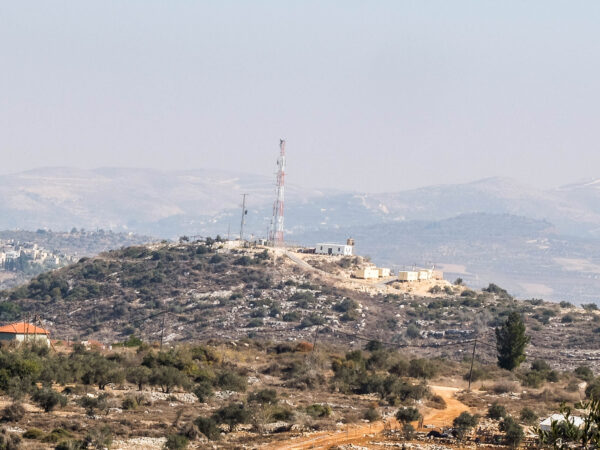
“That’s an outpost, the beginning of a new settlement. First they put a container, a shack, something. Then a fence. Then a house. And then it becomes a settlement.”
They built it not even a year ago, after 7 October. “Those were my grandfather’s lands. I remember as a child accompanying him to graze the goats up there. Now they’ve taken it.”
Another cigarette. “There’s a song here in Palestine, it talks about Rome too,” he laughs. “Nero in Rome, he burned everything. Nero died, Rome endured…. Like here. Occupation will finish, Palestine will resist.”
Kafr Qaddum, November
Kafr Qaddum is a village about 13 kilometers west of Nablus, one of the largest cities in the West Bank.
The village has around 4,300 inhabitants and is surrounded by ancient olive groves. It also has five settlements in the hills around it. Kafr Qaddum is considered a village of resistance, with a history of struggle that spans more than 20 years, with no end in sight.
Eleven thousand dunams of the village’s land (about 52 percent of the total area) have been declared “Area C,” meaning they are under the full control of the Israeli Occupation Force (IOF) which has taken more and more land over the years. As in many other places, the IOF has banned access to land “too close” to the settlements, i.e., at an indefinite distance they determine as they wish. This ban means blocking and destroying the economy of hundreds of local Palestinians, since the trade in olives and olive oil is the economic mainstay of Kufr Qaddum.
Besides, it is also a matter of principle. “We love these lands, these trees,” says Madhat, one of the residents prevented from accessing their olive groves. “We love Palestine… It is our land.” He adds: “We will never leave.”
The army will give permission to reach the land only twice a year, once to clean the land, another time to harvest olives. But often, it won’t even grant those.
Settlers often prevent the harvest anyway, or destroy olive groves to send Palestinian farmers away for good.
“We don’t ask for ‘coordination.’ No agreement with the occupation forces. Should we ask for permission to access our own lands?” insists Abdullah, another Palestinian from the village detained in Israeli jails many times for his resistance.
In addition to being denied access to their land, since 2003, the local Palestinians have been blocked from using the main road from Kufr Qaddum to Nablus by the Israelis. “It used to take us 15 minutes to get to the city,” Madhat says. “Now it takes us at least 45 because of this permanent roadblock.” In fact, a gate prevents Palestinians from passing through. The road is now only for the Israeli settlement, which was funded by the far-right Zionist group Gush Emunim in 1975 and has been expanding ever since. Complaints before Israeli courts have been to no avail. Since 2011, the citizens of Kufr Qaddum have been organizing weekly demonstrations every Friday. Their protests try to approach to the gate. They meet with stiff repression.
“They shoot at us tear gas, rubber-coated steel bullets, real bullets. We have had so many injured over the years, so many have risked their lives,” explains A.
According to Harretz, more than 100 villagers were injured, including six children. The latest is a 9-year-old boy who was shot in the head by a soldier and miraculously survived.
At least 175 villagers have been arrested for participating in protests; more than half a million shekels have been paid by families as bail over the years.
Attempts at negotiations have fallen on deaf ears. The community repeatedly offered to stop the protests if the road was reopened: but the IOF has always refused. And the protests continue to this day, although in recent months the encirclement by the police forces is often so tight that they cannot even march at all.
By the time we start harvesting olives, the sun is already high. We have spread the tarps, and pick the lowest branches when, “Here come the soldiers!” someone says. Two white cars stopped on the road below the terraces, and seven or eight military-looking people approach.
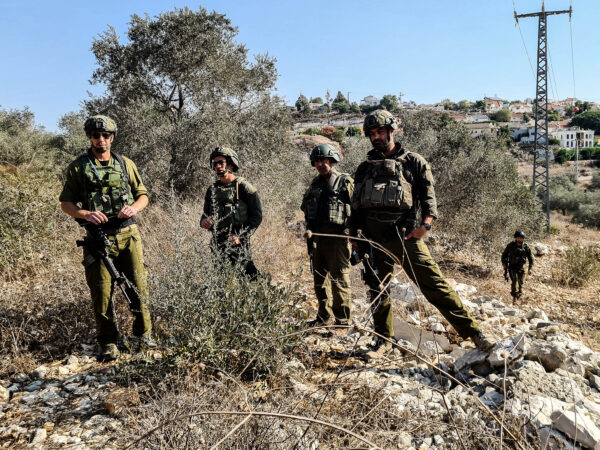
“Let’s keep harvesting,” is the agreement. The approaching individuals are dressed in army green uniforms and carry machine guns. They have no insignia, their shoes are not all the same. Hard to tell if they are security settlers or military, though it makes little difference: they now have almost the same powers, and they threaten and arrest in the same way.
“Stop the work! Stop! You have to go away!” One of them begins.
The number of foreign pickers certainly diminishes the level of their violence. That is what the international solidarity volunteers are for: by our presence we hope to deter conflict and limit the repression of the Palestinians, in an effort to redress some of the power imbalance to enable the olive harvest.
Most of us continue working, some approach the soldiers.
“What? Where is the problem?” they ask.
“You can’t be here, it’s illegal. You are less than 200 meters from the settlement. You have two minutes to leave or we will arrest you.” They threaten.
Less than 200 meters? The group is at least 500 meters from the encroaching settlement. “We are more than 200 meters away,” someone objects, but it’s no use. Some of us keep arguing, the others keep working.
The ‘soldiers’ notice the Palestinian who owns the olive grove; one of them talks to him in Arabic and makes him approach. They argue and surround him, weapons in hand. They push him toward the road. The protests of us the sympathizers are useless.
“He is under arrest. He knew he couldn’t stay here. Now you have two minutes to leave or we will arrest you too.”
We say we’ll go if they release the man.
“I don’t have to bargain with you. Leave!”
From a distance the military man can be seen putting a blindfold on the Palestinian farmer. Then he pulls out his cell phone and takes a selfie with the newly-arrested man. Some of us continue to argue, buying more time, and two more olive trees are harvested.
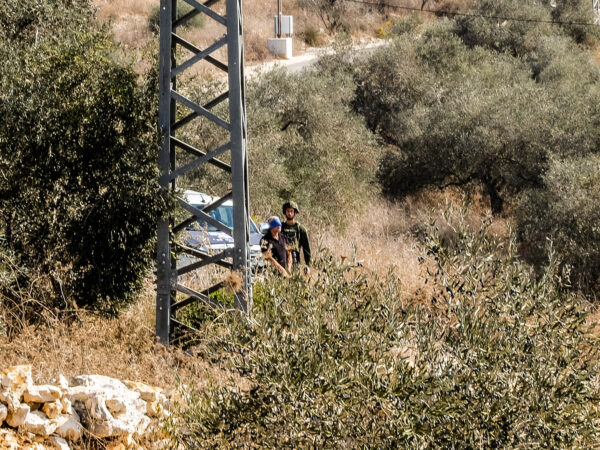
Then the military warms up. “That’s enough, we’ve been arguing for 45 minutes and I gave you two! Now you’re leaving.” The tone is rising.
The tarps are pulled up, the last olives are gathered, and the retreat begins.
A teargas canister is on the ground, still full of gas. Probably left from last year when, following 7 October, almost all olive harvesting was prevented; a revenge by the state of Israel on the economy of the Palestinian people. For that reason, this year many civil society organisations called for international solidarity and urged young and old from all over the world to join the Palestinians for the harvest. Hundreds of people have responded to the call of movements such as ISM and Faz3a to offer protective presence in defence of the civilian population.
Meanwhile in April, Israel’s Minister of National Security, Itamar Ben Gvir, initiated a “task force” specifically targeting foreign activists in the West Bank: it appears that the government does not want witnesses or hindrances to the violence meted out to Palestinian farmers among the olive groves.
We climb up to the waiting Palestinians a little higher away from the military. They are quiet – used to this oppression. We sit in the shade of a large olive tree and they bring out lunch: manāqīsh with plenty of za’tar and cheese, hummus, and of course cigarettes.
Madhat then takes us for tea at his house.
I ask him if this happens all the time. “Eh! Often,” he says. “I was arrested three times last week,” he laughs. “They keep you five, six, seven hours. Then they released me.”
Before release, detainees are often beaten. But Madhat doesn’t tell me that. “That’s how it is here.” After tea he offers us coffee. “Tomorrow I will come back. And the day after tomorrow, too.” He shakes our hands. “We, from here, will never leave.”
Pictures from the olive harvest
